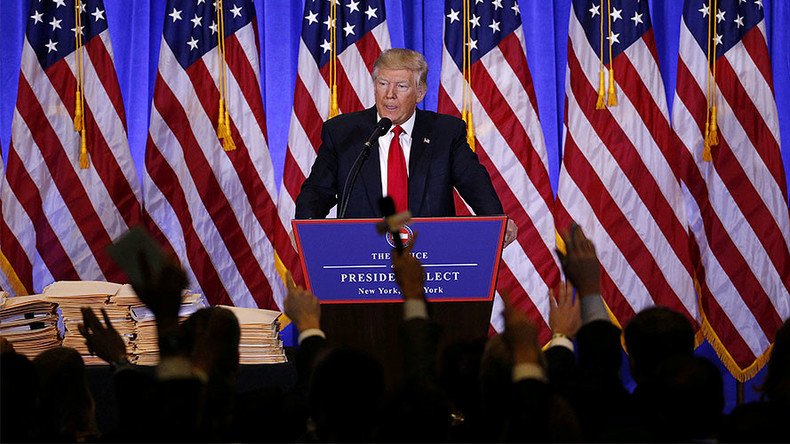‘Trump base don’t care about his ‘Russian dossier’’

Did BuzzFeed do the public a favor by publishing the unverified dossier on Donald Trump? Or is it a defamation and libel you can’t get away with in American law? Do Trump supporters care about any media allegations? RT discussed with some analysts.
On Wednesday, Donald Trump gave his first news conference since winning the November presidential election. In a fiery exchange with reporters, he accused several outlets of spreading fake news.
Several have been running a story about Trump's alleged secret ties with the Russian government, with the words “explosive but unverified.”
#Trump slams #Buzzfeed as 'failing pile of garbage', rejects #CNN question over 'fake' report https://t.co/Edeb8gbB6Mpic.twitter.com/mB4mT3lETI
— RT (@RT_com) 11 января 2017 г.
Why would respected outlets like CNN and the Guardian seize on this kind of information without being sure whether it's true? RT discussed with Lionel, legal and media analyst, Daniel McAdams, executive director of Ron Paul Institute for Peace and Prosperity and John Graham, a former US diplomat.
“The other reputable outlets like The New York Times have stayed back from making the accusations. And of course, Trump himself denied them very strongly. I have no personal information, but they are amazing allegations… Most media outlets say there isn’t enough proof,” said John Graham.
According to Daniel McAdams, “despite the near universal condemnation of BuzzFeed for publishing the report in its entirety, I would offer counter-argument, which is that BuzzFeed did us all a very great favor in printing the entire dossier.”
He added: “Up until that point reporters such as David Corn and Mother Jones had used the report to give the innuendo that he was somehow being cultivated by the Russians, that they have developed some information on him. But looking at the entire article, the entire dossier, we can see how absolutely absurd it was; we can see at its face value; we can see holes in it.”
Lionel, however, disagrees it was a great service.
Trump blackballs @CNN's Acosta 'YOU ARE FAKE NEWS!' at #TrumpPressConferencehttps://t.co/Sm1tWa7JPKpic.twitter.com/il76jF6Ji8
— RT (@RT_com) 11 января 2017 г.
“First, I love the word 'dossier.' Sounds whole James Bond-esque… Already people are saying 'dossier' without asking “what the heck is a dossier?” The other thing they say is – with one hand they give it, with the other – they take it away. I am a lawyer by profession. I love language. They are explosive but unverified. They are damaging but completely specious,” he said. “You can’t do that in American law – especially when it comes to libel, slander and defamation. You can’t get away from defaming someone, slandering, libeling by throwing in the parenthetical ‘unproven.’ This is the twilight zone. I have never seen anything like this. If it wasn’t so pathetically scary, it would be the funniest thing on television.”
John Graham recalled that during the election campaign all kinds of allegations came out in the media and many of them proved to be entirely true. However, he still made it to the White House.
“That was really damaging to Trump, and he still won the election. His base really doesn’t care. So if any of these allegations are true - and there is no proof that they are – that he was, for example, playing around in Moscow hotels, or whatever, it’ll produce a big yawn among part of the American electorate. That is just the fact,” he said.
The statements, views and opinions expressed in this column are solely those of the author and do not necessarily represent those of RT.












